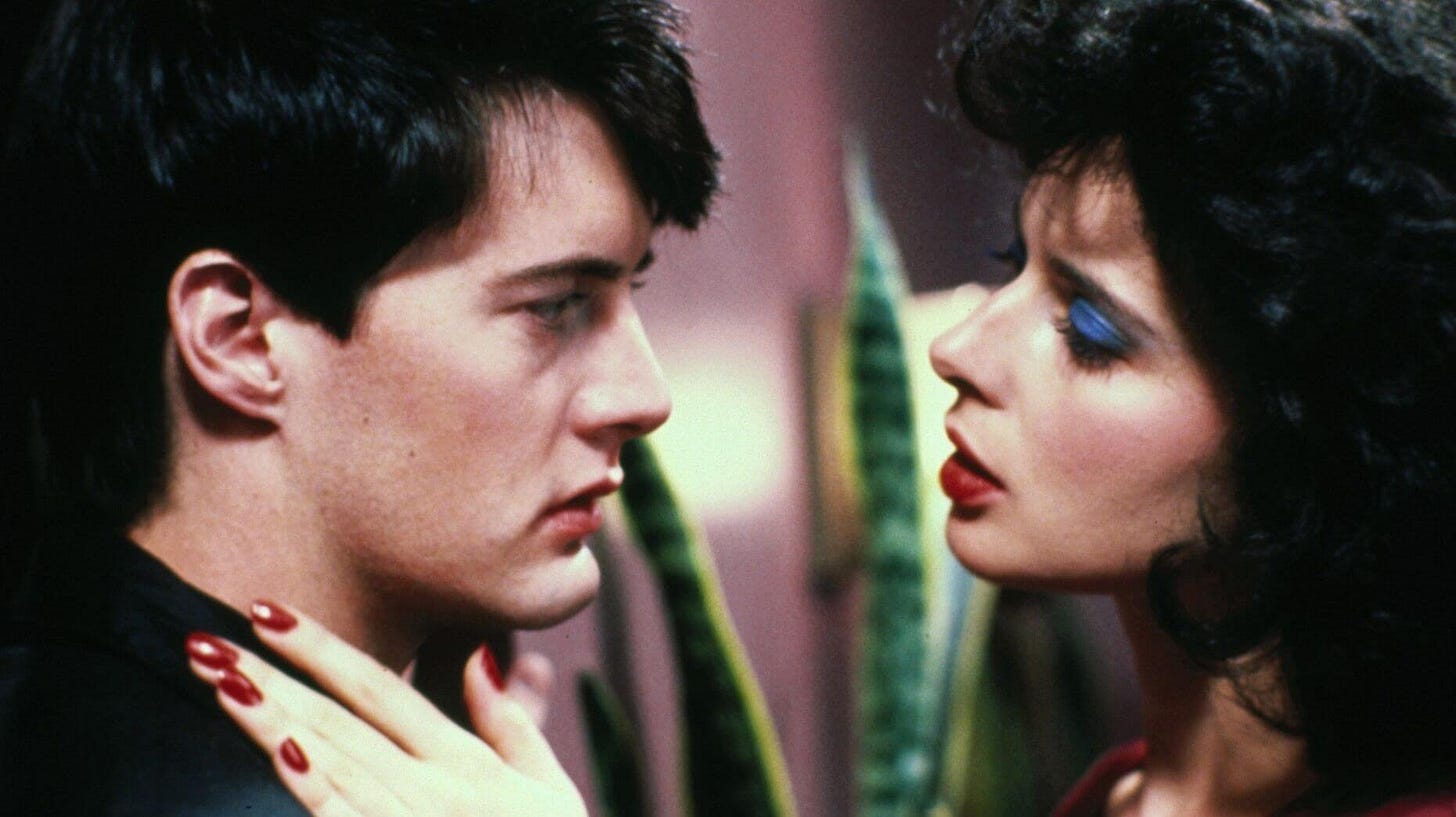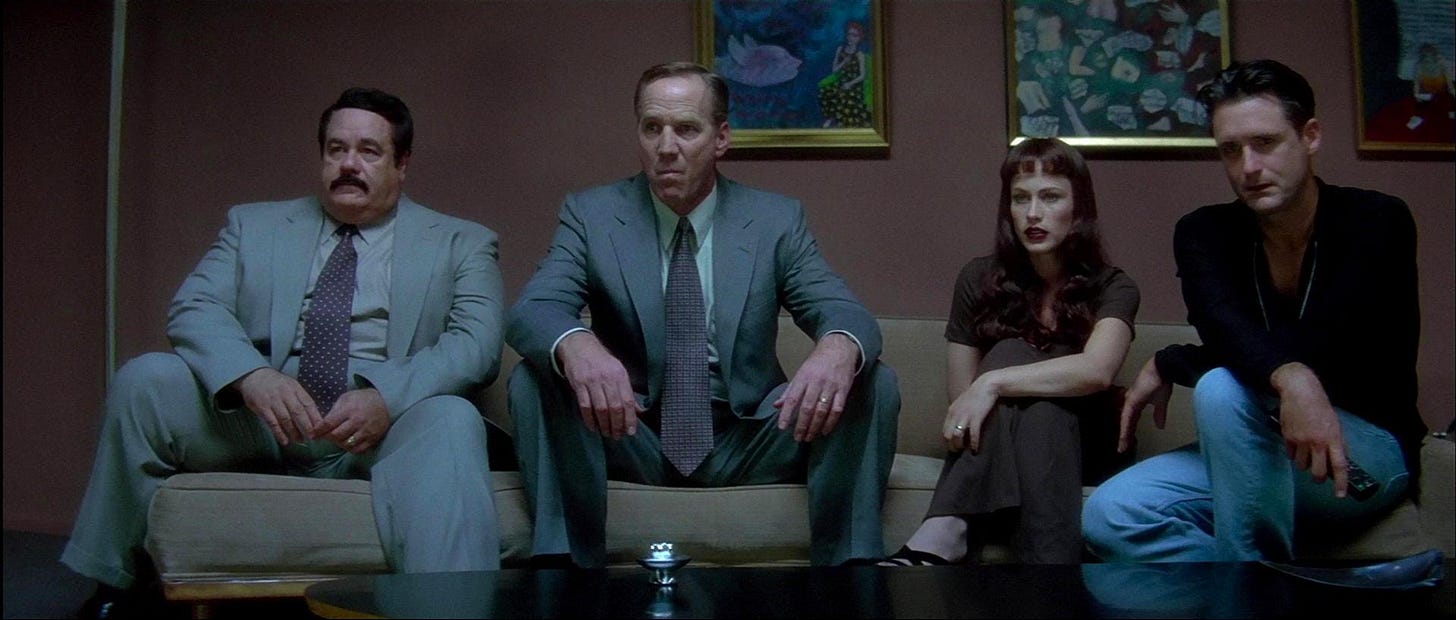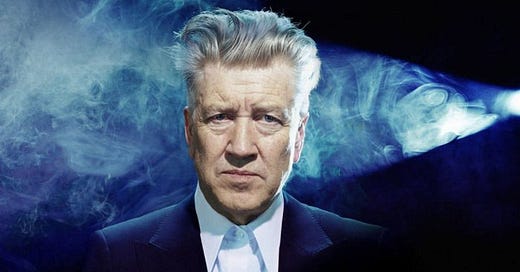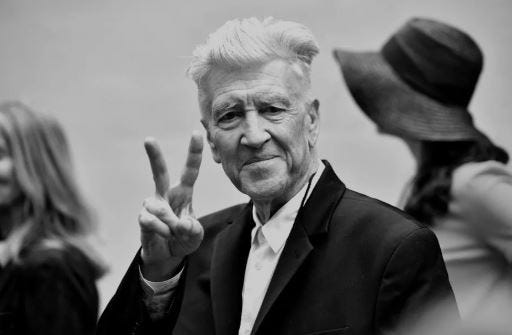The Radical Visionary: David Lynch Forever
Dearest Reader,
I have been thinking about this newsletter ever since January 15, 2025 when the legendary filmmaker David Lynch passed away, just five days before his 79th birthday. I immediately placed my hand over my heart and took a deep breath, feeling a mixture of sorrow and deep affection as flashes of his films cast beneath my eyelids. David Lynch. The one and only. I want to write this newsletter, not only to celebrate the artist, but to express what his vision of the world means for cinema and how it speaks to the American experience in a manner unlike any other contemporary filmmaker.
The first time I saw any of Lynch’s films, I believe it was Blue Velvet (1986), I was very young. What I remember most was the mood of the movie and fragments of a few scenes. The mood was ominous, mysterious, dark, alluring and frightening all at the same time. Palpable emotions turn out to be a hallmark of my relationship to Lynch’s work—deep, puzzling emotions as though you’re walking down a dark corridor uncertain of what you might find or why your walking this path or why you’re a bit frightened. And yet, you return again and again because the experience of a Lynch film is so creatively unique and seductive.
The world that Lynch’s art inhabits, is a dream world born of his creativity, a bold commitment to the unconscious. What you witness on screen changes entirely from project to project, yet his unique signature ethos shines through. David Lynch was fascinated by the human condition and the mystery that exists within all of us and around us, for that matter. As we stagger into another Trump presidency, I now consider Lynch as a kind antidote to the willful ignorance of this administration because Lynch harmonized with life and demonized no one. He was a very positive, upbeat person and any friction on screen was a mere reflection of his love of ideas and his courage to explore the unconscious so as to dissipate any negativity in daily life. His work makes you look within despite the immediate demand to watch the screen.
Recently, I watched a few works directed by Lynch, films featuring him as a performer and media documenting him as a subject. And as I was watching him in these various contexts, I thought, “Aha! This man, born into suburban white America, saw the menacing edges of American life as explored through the subconscious and he made it into art.” Indeed, the settings of many of his films take place in recognizable scenes of American life. Instead of confronting Americans with who we are in literal terms, Lynch explored the American psyche; the human condition relating to its environment.

An avid practitioner of Transcendental Meditation, Lynch meditated twice a day for some 46 years. He maintained a disciplined artistic practice, building on his training as a painter at Pennsylvania Academy of Fine Arts in Philadelphia. His studies in Philadelphia led to making “moving paintings with sound” before being accepted for post-graduate studies at American Film Institute, Center for Advanced Film Studies in Los Angeles. While at the American Film Institute, the young filmmaker crafted his first film, which redefined visual storytelling with the 1977 cinematic marvel Eraserhead. From then on, Lynch miraculously managed to carve out a respected career in Hollywood without being controlled by the industry. He was an observer of American vice, drawn to it like a moth to a flame, yet maintaining a healthy distance.
Carl Jung, the revered Swiss psychiatrist and psychotherapist, often spoke of the “daimon,” a Greek term that was later taken to mean something wholly negative as a “demon” in Christianity. However, according to the Greeks and Jung, daimon was a part of each human-being’s unconscious, connected to their life’s purpose. The daimon, only discernable through intuition and dreams, could be a positive or negative influence depending on one’s relationship to it, but it holds the blueprint to their destiny. I suppose one could say that depending on how easily one’s daimon is sensed by their intuition or understood within a dream state, that person could access or lose connection to this guiding force. According to Jung, this force or form of awareness, the daimon, may be the key to one’s destiny. Destiny speaks to the choices we make in life, whereas fate is the absence of choice—it is death.
As posited by Jung, the daimon governs our vocation, motivation, creativity, and potential for fulfillment in life. Some argue that, addictions are connected to one’s lack of relationship with their daimon. When one feels ‘out of control’ that may be the unacknowledged daimon demanding attention; an outlet for healthy expression. Jung thought the daimon to be apart from and arguably above ego consciousness, so it exerts more control over the psyche than our conscious awareness. When one harmonizes with their daimon, that person is blessed, but when the daimon is ignored, there is torment. I mention all this to say that I think David Lynch, as evidenced by his unparalleled creative rendering of the subconscious on screen, was in harmonious relationship with his daimon. And by building a career projecting his creativity into the world through dream-like films and art, he inspired the viewer to access their own daimon, their own intuition or dreams.

Several days ago I re-watched Lynch’s 1997 classic Lost Highway starring Patricia Arquette, Bill Pullman, Balthazar Getty, Robert Blake and Frank Loggia. I was dreading re-watching it because I saw it for the first time in the early aughts and was so disturbed by it that I never had the nerve to revisit it. And yet, Lost Highway is the David Lynch movie that made me a lifelong fan of his work. Like Blue Velvet, the narrative yet impressionistic filmmaking that Lynch perfected, reflected something back to my own unconscious that perceived a perplexing mix of fear, lust, darkness and mysticism. I was young, knew little of life outside of college and family, so Lost Highway felt so far away and inscrutable. But when I watched again some 20 years later, peaking from between my fingers, the film is far less disturbing than I remember. Indeed, it boasts a non-linear, almost otherworldly storyline that I could only explain as a thematic mingling of Los Angeles detective noir, taboos, sexuality, inner torment, obsession, violence and power. Lost Highway is also beautiful…poetic even. Like all of Lynch’s films, the story, cinematography, casting, sound design, costume and set design offer a feast for the senses.
That is what I love about Lynch—his potent, surreal creativity. It’s almost like Lynch’s daimon speaks dream-like gibberish that our collective unconscious as viewers can connect to. However, his fully expressed daimon collides with each individual daimon, demanding to be acknowledged, so his work can be indiscernibly jarring. I suppose that’s why Lost Highway scared and seduced me. When I re-watched it, now an adult with life experience, it was like I witnessed a totally new movie and I still enjoyed it.
I live “The Art Life” now, a phrase coined by Lynch and inspired by Robert Henri’s book The Art Spirit (published in 1923), so my daimon is far less aggravated by Lynch’s daimon than when I was younger. I regularly engage with my intuition and dreams, following my own unique destiny. “The Art Life” is what Lynch described as “coffee, cigarettes, maybe some great wine; catching ideas and translating them to one medium or another…” My Art Life is green juice, cycling and voracious consumption of diverse art and literature alongside catching ideas to manifest in one form or another. I like thinking and daydreaming, but Lynch is one of the figures who gave me confidence to live The Art Life, alongside some kind friends I’ve met along the way. So when he transitioned towards his fate in January, I felt a tremendous loss. But then something miraculous happened, David Lynch visited me through my dreams and intuition and I knew he wasn’t gone, he’s just on another plane of consciousness now—he transcended.
With Love During End Times,
Agunda
Rest in Peace Mr. Lynch. Oh man, I’ll love you forever.






